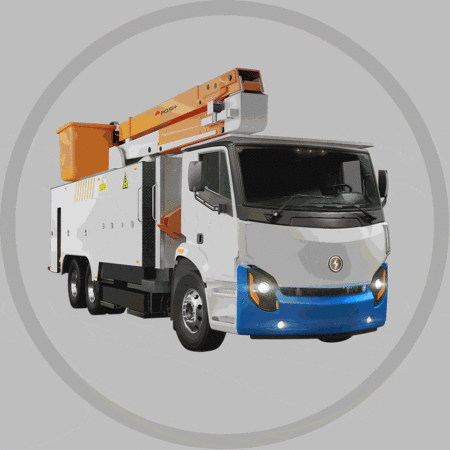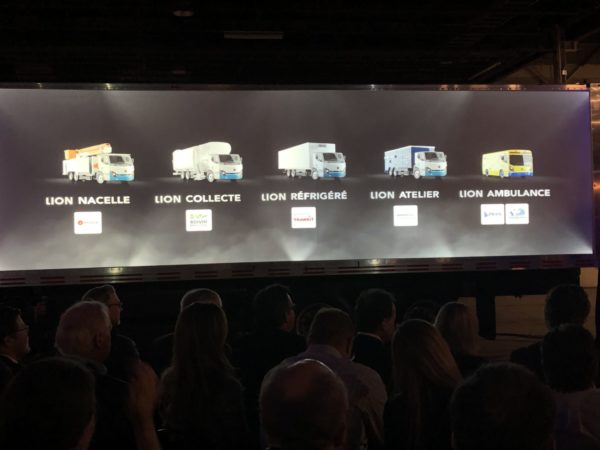Lion Electric goes to work on vocational truck project

SAINT-JEROME, Que. – Lion Electric Company, a Quebec-based electric vehicle manufacturer, will develop vocational versions of its Class 8 Lion8 electric truck – supported by $7.9 million in provincial funding and a collaboration with six partners.
The project, estimated to be worth $15.8 million, will develop battery-electric refuse vehicles, a refrigerated truck, mobile workshop, a bucket truck, and an ambulance. Each will use the same chassis and powertrain used by a minibus that Lion expects to bring to market next year.
“Today, we are moving to a higher stage, at a level that has never been achieved until now anywhere in the world,” said Marc Bédard, CEO and founder of Lion. “The current project will integrate 100% electric, or mostly electrical equipment, on 100% electric trucks without any secondary energy sources. For the customers, this will allow to acquire a perfectly integrated vehicle, as if they were buying it from a single manufacturer. ”
The six Lion partners are Posi-Plus Technologies, a manufacturer of industrial equipment including bucket trucks; Boivin Evolution, the maker of automated refuse vehicles; Fourgons Transit, a major manufacturer of dry and refrigerated truck bodies; Maxi Metal, designer and manufacturer of fire trucks and workshop trucks; PRAN, a firm specializing in electronic and multiplexing systems for vehicles; and Demers Ambulance, the second largest ambulance manufacturer in North America.
“All this group of leaders gathered in the same project. I think it’s a first,” said Bédard.
Louis Leclair, president of Fourgons Transit, explained to trucknews.com that his company is designing a Class 6 truck body with the same load capacity as a Class 7. “We are going to make the body hyper-lightweight and will redesign the Frio reefer body to optimize energy efficiency, but especially reduce the weight considerably. Thus, we will get more payload and maximize battery life. Transit will particularly focus on the aerodynamics, efficiency, weight and integration of the van with the Lion8 truck.”
The number of bodies to be built for the Lion8 will depend on the price of the chassis, he said. “This is a product that we will distribute throughout North America. We do not do that only for Quebec. All the designs will be designed for a North American clientele. ”
Hydro-Québec ordered a prototype bucket truck for delivery in December 2020, confirmed Claudine Bouchard, vice-president – distribution network.
The provincially owned company plans to test the battery life in an application that relies on electrical and hydraulic equipment that often works in harsh weather.
Bouchard also emphasized the importance of battery weight in the context of Quebec’s spring thaw period, when weight limits apply.
The specialized Lion8s are destined as much for the Canadian market as for the United States, said Patrick Gervais, Lion’s vice-president – marketing and communications. “There is a great demand from many industries for electrification, especially because of the lower maintenance costs.”
Lion sold its first all-electric refuse truck to the City of White Plains, N.Y.
The company is currently opening what it calls “experience centers” across the United States as well.
“Experience centers are places where people can come and see our products and try them out,” says Gervais. “There is also training and final assembly for certain vehicles. This is also where service teams are based.”
It opened one in New York in October, with another to come to Los Angeles in January. It has tripled the capacity of its Sacramento center and plans to open five new centers in the United States next year.
Right now, refuse and bucket trucks are the most promising markets for Lion in the United States.
“There are 15.5 million trucks in the United States. It’s a huge market for us,” said Gervais. “Starting next January, we will have a production capacity of 2,500 trucks per year. Our goal is to reach this capacity as quickly as possible and to increase it over time. ”
Lion wants Quebec to be a pioneer in the adoption of the electric truck, but obviously recognizes the volumes south of the border. Currently, orders are evenly split between Canada and the United States, but each month the United States is gaining ground, due in part to the country’s financial structure and its desire to integrate zero-emission vehicles, he said.
“Purchasing incentives clearly accelerate the acquisition process, and Americans offer more than Canadians on that aspect — with the exception of Quebec and British Columbia. Surprisingly, we see a great opening in Alberta and Manitoba, where there is hydroelectricity.”
Lion ultimately expects 80% of its sales to be south of the border.

Have your say
This is a moderated forum. Comments will no longer be published unless they are accompanied by a first and last name and a verifiable email address. (Today's Trucking will not publish or share the email address.) Profane language and content deemed to be libelous, racist, or threatening in nature will not be published under any circumstances.